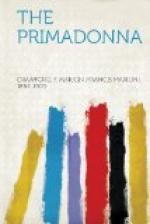Lady Maud, indeed, was protected to some extent by her father and brothers, and by many loyal friends. It is happily still doubtful how far one may go in printing lies about an honest woman without getting into trouble with the law, and when the lady’s father is not only a peer, but has previously been a barrister of reputation and a popular and hard-working member of the House of Commons during a long time, it is generally safer to use guarded language; the advisability of moderation also increases directly as the number and size of the lady’s brothers, and inversely as their patience. Therefore, on the whole, Lady Maud was much better treated by the society columns than Margaret at first expected.
On the other hand, they vented their spleen and sharpened their English on the American financier, who had no relations and scarcely any friends to stand by him, and was, moreover, in a foreign country, which always seems to be regarded as an aggravating circumstance when a man gets into any sort of trouble. Isidore Bamberger and Mr. Feist had roused and let loose upon him a whole pack of hungry reporters and paragraph writers on both sides of the Atlantic.
The papers did not at first print his name except in connection with the divorce of Lady Maud. But this was a landmark, the smallest reference to which made all other allusions to him quite clear. It was easy to speak of Mr. Van Torp as the central figure in a cause celebre: newspapers love the French language the more as they understand it the less; just as the gentle amateur in literature tries to hide his cloven hoof under the thin elegance of italics.
Particular stress was laid upon the millionaire’s dreadful hypocrisy. He taught in the Sunday Schools at Nickelville, the big village which had sprung up at his will and which was the headquarters of his sanctimonious wickedness. He was compared to Solomon, not for his wisdom, but on account of his domestic arrangements. He was indeed a father to his flock. It was a touching sight to see the little ones gathered round the knees of this great and good man, and to note how an unconscious and affectionate imitation reflected his face in theirs. It was true that there was another side to this truly patriarchal picture. In a city of the Far West, wrote an eloquent paragraph writer, a pale face, once divinely beautiful, was often seen at the barred window of a madhouse, and eyes that had once looked too tenderly into those of the Nickelville Solomon stared wildly at the palm-trees in the asylum grounds. This paragraph was rich in sentiment.




